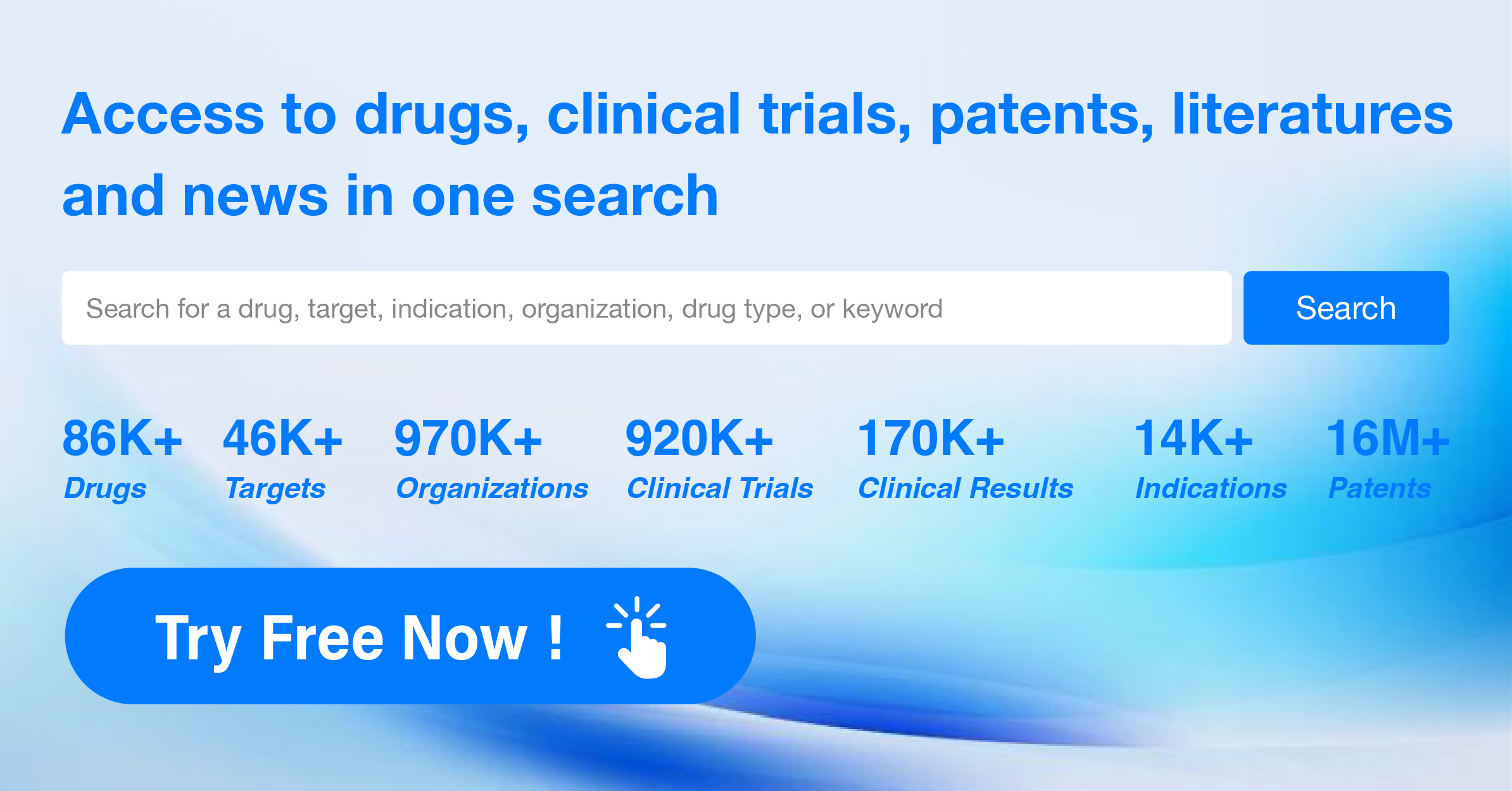Pharma Frontiers: Daily Digest of Global Pharmaceutical News - Jun 14
1.Novartis Announces Approval of New Indication for JAK Inhibitor Ruxolitinib Phosphate in China
On June 13, Novartis announced that its JAK inhibitor, Ruxolitinib Phosphate tablets, had received approval from the China National Medical Products Administration (NMPA) for a new indication: the treatment of chronic graft-versus-host disease (cGVHD) in patients aged 12 and older who have inadequate responses to corticosteroids or other systemic therapies. Previously, in 2023, Ruxolitinib was approved by the NMPA for the treatment of acute GVHD (aGVHD) in patients aged 12 and older who had inadequate responses to corticosteroids or other systemic therapies. Furthermore, it was approved in China in 2017 for adult patients with intermediate- or high-risk primary myelofibrosis (PMF), post-polycythemia vera myelofibrosis (PPV-MF), or post-essential thrombocythemia myelofibrosis (PET-MF) to treat disease-associated splenomegaly or related symptoms. Hematopoietic stem cell transplantation offers a new lease on life for many patients with hematologic diseases; however, 30% to 70% of patients who undergo allogeneic hematopoietic stem cell transplantation face the threat of cGVHD. Corticosteroids remain the frontline treatment for cGVHD, but their effectiveness rate is only 50% to 60%, with some patients progressing to steroid-refractory cGVHD (SR-cGVHD). These patients have poor prognoses, and long-term use of corticosteroids can lead to adverse effects such as infections and osteoporosis, increasing the risk of poor outcomes. There is still a significant unmet medical need for patients with SR-cGVHD. The mechanism of cGVHD is complex, with the primary pathophysiological process being immune-inflammatory reactions, commonly manifesting as fibrosis. The Janus kinase 1 and 2 (JAK1-JAK2) signaling pathway plays a critical role in the steps leading to inflammation and tissue damage. Ruxolitinib, a JAK1/2 inhibitor, can reduce the incidence of cGVHD by inhibiting donor T-cell proliferation, the production of inflammatory cytokines, and the function and activity of Tregs. Additionally, preclinical studies on systemic sclerosis indicate that Ruxolitinib can prevent or ameliorate skin and lung fibrosis, demonstrating anti-fibrotic properties.
2.Zelgen Biopharmaceuticals' Small Molecule Dual Inhibitor Achieves Primary Endpoint in Phase 3 Clinical Trial for Severe Alopecia Areata
On June 12, Zelgen Biopharmaceuticals announced that the Phase 3 pivotal trial of its independently developed Class 1 new drug, Jaktinib Hydrochloride Tablets, for the treatment of severe alopecia areata has met its primary efficacy endpoint, achieving statistical significance. Zelgen Biopharmaceuticals stated that the company will accelerate the market approval process for this indication.
Jaktinib Hydrochloride is a novel dual inhibitor of JAK and ACVR1. Alopecia areata is a common inflammatory non-scarring hair loss condition, ranking as the second most prevalent form of hair loss globally. Clinically, it is characterized by sudden, well-defined, round patches of hair loss on the scalp. Approximately half of the patients experience recurrent episodes, which can persist for years or even decades. Although the exact etiology of the disease is not fully understood, research has identified that the JAK-STAT signaling pathway plays a key role in the onset of alopecia areata.
The study achieving the primary endpoint was conducted in 44 hospitals across China and involved the random enrollment of 425 patients with severe alopecia areata who met the protocol criteria. These patients were assigned to receive either 50mg Jaktinib tablets bid, 75mg Jaktinib tablets bid, or a placebo. An independent third-party unblinded team analyzed the data after 24 weeks of treatment. The results showed that both Jaktinib dosage groups significantly outperformed the placebo group in the primary efficacy endpoint (percentage of participants with a SALT score ≤20 after 24 weeks of treatment), achieving statistical significance. In terms of safety, Jaktinib demonstrated a favorable safety and tolerability profile in the treatment of severe alopecia areata patients.Detailed data from this clinical trial will be presented at upcoming relevant academic conferences. Additionally, an extension study for the Phase 3 clinical trial of Jaktinib in treating severe alopecia areata is currently underway.
3.Junshi Biosciences' Anti-PD-1 Monoclonal Antibody Achieves Primary Endpoint in Phase III Clinical Trial for First-Line Treatment of Liver Cancer
On June 11, Junshi Biosciences announced that its independently developed anti-PD-1 monoclonal antibody, Toripalimab, in combination with Bevacizumab, has met the primary endpoints of the Phase III HEPATORCH study for first-line treatment of advanced hepatocellular carcinoma (HCC). Both progression-free survival (PFS, based on independent radiological assessment) and overall survival (OS) reached the pre-set efficacy boundaries of the study protocol. Junshi Biosciences plans to submit a marketing application for this new indication to regulatory authorities in the near future.
Liver cancer is a common malignancy of the digestive system worldwide, predominantly of the HCC type (accounting for approximately 90%). According to the GLOBOCAN 2022 report, the global incidence of liver cancer was 866,000 new cases and 759,000 deaths in 2022. In China, there were 368,000 new cases (42.4% of global cases), ranking fourth among all malignancies, and 317,000 deaths (41.7% of global cases), ranking second among all malignancies. Due to its insidious onset, about 70% to 80% of liver cancer patients in China are diagnosed at an advanced stage, with a median OS of approximately 10 months and a 5-year survival rate of about 12%.
In recent years, the treatment landscape for advanced liver cancer has undergone a transformation with the advent of combination therapies based on immunotherapy drugs. Toripalimab has, to date, been involved in more than 40 clinical studies covering over 15 indications worldwide, including in China, the United States, Southeast Asia, and Europe. Ongoing or completed key registration clinical studies have evaluated the safety and efficacy of Toripalimab across various tumor types, including lung cancer, nasopharyngeal carcinoma, esophageal cancer, gastric cancer, bladder cancer, breast cancer, liver cancer, kidney cancer, and skin cancer.
4.Pfizer's Phase III CIFFREO Study of Gene Therapy for DMD Fails to Meet Primary Endpoint
On June 12th, Pfizer announced that the Phase III CIFFREO study of the gene therapy fordadistrogene movaparvovec (PF-06939926) for the treatment of Duchenne muscular dystrophy (DMD) did not meet its primary endpoint. The CIFFREO study is a global, multicenter, randomized, double-blind, placebo-controlled clinical trial evaluating the safety and efficacy of fordadistrogene movaparvovec in non-ambulatory DMD boys aged 4-7 who are receiving daily corticosteroid treatment. The primary endpoint of the study was the change from baseline in North Star Ambulatory Assessment (NSAA) total score, which assesses motor function, over the course of one year. In addition to the primary endpoint, key secondary endpoints, including changes in 10-meter walk/run speed and the speed of transitioning from lying down to standing, were also not met.
However, the safety profile of fordadistrogene movaparvovec was deemed manageable, with most reported adverse events (AEs) being mild to moderate in severity. Pfizer will continue to closely monitor the participants and will evaluate the next steps for the study. Additionally, a month ago, the Phase II DAYLIGHT study of fordadistrogene movaparvovec in 2-3-year-old DMD boys reported a death due to a serious adverse event (SAE), leading Pfizer to pause the overlap between the DAYLIGHT and CIFFREO studies.
DMD is a severe genetic disorder predominantly affecting boys, characterized by progressive muscle degeneration and weakness, with symptoms typically appearing between the ages of 3 and 5. Muscle weakness can begin as early as age 3, initially affecting the muscles of the hips, pelvic area, thighs, and shoulders, and later impacting the skeletal muscles of the arms, legs, and trunk. By their teenage years, patients usually lose their ability to walk, and the heart and respiratory muscles become affected, ultimately leading to premature death.
5.Innovent Biologics’ Innovative ADC IBI343 Receives FDA Fast Track Designation for Treatment of Pancreatic Cancer
On June 13th, Innovent Biologics announced that its anti-CLDN18.2 antibody-exatecan mesylate conjugate drug (ADC) IBI343 received Fast Track designation from the U.S. FDA, targeting patients with advanced pancreatic ductal adenocarcinoma (PDAC) expressing CLDN18.2 who have received at least one prior systemic therapy. Previously, the FDA had approved the Investigational New Drug (IND) application for IBI343 for the treatment of pancreatic cancer. Claudin family members are key structural and functional components of epithelial tight junctions. Claudin 18.2 (CLDN18.2) is typically buried in the gastric mucosa, but malignant tumors can disrupt tight junction integrity, exposing CLDN18.2 epitopes on the tumor cell surface. CLDN18.2 is expressed in 50% to 70% of pancreatic cancer patients, making it a noteworthy target.
IBI343 is a recombinant human anti-CLDN18.2 ADC. Upon binding to CLDN18.2-expressing tumor cells, it undergoes CLDN18.2-dependent ADC internalization, releasing the payload drug, which induces DNA damage and leads to tumor cell apoptosis. The released toxin can also diffuse through the plasma membrane to kill neighboring tumor cells, illustrating a bystander effect. In May 2024, China's National Medical Products Administration (NMPA) Center for Drug Evaluation (CDE) included IBI343 in the list of breakthrough therapies for the treatment of advanced gastric/gastroesophageal junction adenocarcinoma expressing CLDN18.2 in patients who have received at least two prior systemic therapies. The current FDA Fast Track designation applies to advanced pancreatic ductal adenocarcinoma expressing CLDN18.2.
At this year’s American Society of Clinical Oncology (ASCO) Annual Meeting, Innovent Biologics presented preliminary data from a phase 1 study of IBI343 in pancreatic cancer patients who had undergone at least one line of therapy. The data showed that among patients with pancreatic cancer expressing CLDN18.2 IHC1/2/3+ ≥60% (n=10) treated with 6 mg/kg of IBI343, the objective response rate (ORR) was 40%.
6.NodThera’s Small Molecule Therapy Shows Positive Clinical Results, Reducing Weight and Cardiovascular Risk!
On June 13, NodThera announced promising data from its Phase 1b/2a cardiovascular risk study conducted in subjects with inflammatory obesity. The study evaluated the effect of its investigational oral, blood-brain barrier-penetrant NLRP3 inflammasome inhibitor, NT-0796, on patients' inflammatory, cardiovascular, and metabolic risk parameters. Analysis revealed that NT-0796 effectively reduced C-reactive protein (CRP) levels in patients and resulted in significant weight loss.
NodThera is currently preparing for Phase 2 clinical studies targeting obesity and other cardiometabolic diseases, including Parkinson's disease. This announced study enrolled obese subjects with elevated baseline CRP levels, a key marker of chronic inflammatory diseases such as coronary artery disease. Conducted in a clinical setting over 28 days, the study required participants to limit their daily energy intake to 2000 kcal.
The analysis indicated that the trial met its primary endpoint: NT-0796 significantly and rapidly reduced CRP levels compared to the placebo group. Over 75% of subjects in the NT-0796 dose group had CRP levels ≤2 mg/L by day 28, a threshold generally considered to lower cardiovascular risk, whereas this proportion was less than 25% in the placebo group. Additionally, the study demonstrated reductions in other pro-inflammatory and cardiometabolic biomarkers in the NT-0796 dose group, which was a secondary endpoint of the study.
The marked reduction in key biomarkers relevant to cardiovascular and metabolic diseases showed high translational relevance and consistency, underscoring the importance of dual targeting of the brain and peripheral NLRP3. Although all subjects, whether in the drug or placebo group, experienced weight loss due to calorie restriction, the significant weight reduction was more pronounced in the high-risk subgroup within the NT-0796 dose group. This observation, along with the company's early preclinical data, supports the potential of this molecule in anti-obesity applications.
7.Avidity Biosciences Accelerates Enrollment in Cohort for Innovative Oligonucleotide Conjugate Therapy
On June 13th, Avidity Biosciences announced encouraging preliminary data from its investigational antibody oligonucleotide conjugate (AOC) therapy, delpacibart braxlosiran (del-brax, AOC 1020), during the Phase 1/2 FORTITUDE trial. Analysis indicated that patients with facioscapulohumeral muscular dystrophy (FSHD) treated with this therapy experienced a consistent downregulation of over 50% in DUX4-regulated genes and showed a trend towards improved muscle function. In light of these positive results, Avidity plans to expedite the initiation of the enrollment cohort in the FORTITUDE study. According to the press release, del-brax is the first investigational AOC therapy aimed at addressing the root cause of FSHD. FSHD is a rare genetic disorder characterized by lifelong, progressive muscle function loss, significant pain, fatigue, and advancing disability. Currently, there are no approved treatments for FSHD.
FORTITUDE is a randomized, double-blind, placebo-controlled Phase 1/2 trial designed to assess the safety and tolerability of del-brax in patients with FSHD. This preliminary assessment provided safety and tolerability data for all 39 participants over four months. Key results showed an average reduction of over 50% in DUX4-regulated gene expression in muscle tissue. All patients treated with del-brax exhibited a reduction in DUX4-regulated gene expression of over 20%. Novel circulating biomarkers and creatine kinase levels were reduced by an average of 25% or more. Patients displayed trends towards functional improvement, with increased upper and lower limb muscle strength compared to both the placebo group and the ReSolve natural history study, and enhancements in muscle function measured by reachable workspace (RWS). Patient and clinician-reported outcomes also showed trends of improvement. The therapy was well tolerated and safe, with all adverse events being mild or moderate, and no serious adverse events or therapy discontinuations reported.
8.Xuanzhu Biopharmaceutical's PDE5 Inhibitor Licensed to Livzon Pharmaceutical
On June 13th, Sihuan Pharmaceutical announced in a press release that its majority-owned subsidiary, Xuanzhu Biopharmaceutical, has entered into an exclusive licensing agreement with Livzon Pharmaceutical for its independently developed, highly selective phosphodiesterase type 5 (PDE5) inhibitor, Fadanafil (XZP-5849). Fadanafil, a novel chemical drug categorized as Class 1, is a highly selective PDE5 inhibitor developed autonomously by Xuanzhu Biopharmaceutical, which holds independent intellectual property rights and global rights. The product demonstrates efficacy in inhibiting prostate hyperplasia and significantly alleviating lower urinary tract symptoms associated with benign prostatic hyperplasia. Additionally, it shows potential benefits for erectile dysfunction and pulmonary arterial hypertension, while overcoming side effects observed with similar medications like Sildenafil, Vardenafil, and Tadalafil, such as visual disturbances and back pain. Currently, the product is in Phase I clinical trials.
Under the licensing agreement, Livzon Pharmaceutical will acquire exclusive rights for the development, production, and commercialization of Fadanafil's active pharmaceutical ingredient (API) and formulations in the Greater China region and non-regulated markets. Xuanzhu Biopharmaceutical will retain these rights in Europe, the United States, Canada, Japan, South Korea, Australia, and Brazil. Xuanzhu Biopharmaceutical will receive an upfront payment and will be eligible for milestone payments and tiered royalties based on post-launch sales.Xuanzhu Biopharmaceutical, an innovative drug subsidiary of Sihuan Pharmaceutical, focuses on fields such as gastroenterology, oncology, and non-alcoholic steatohepatitis (NASH).
How to obtain the latest research advancements in the field of biopharmaceuticals?
In the Synapse database, you can keep abreast of the latest research and development advances in drugs, targets, indications, organizations, etc., anywhere and anytime, on a daily or weekly basis. Click on the image below to embark on a brand new journey of drug discovery!




